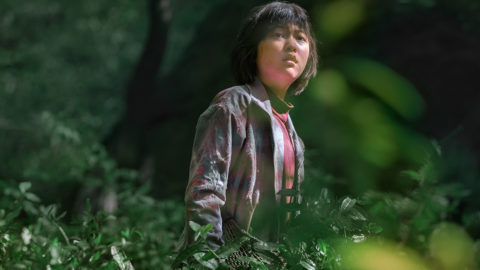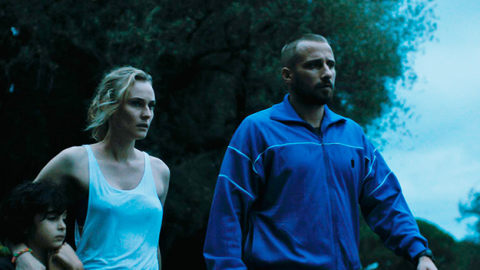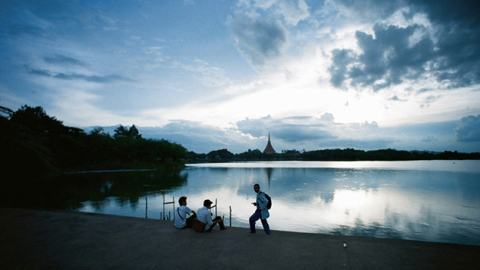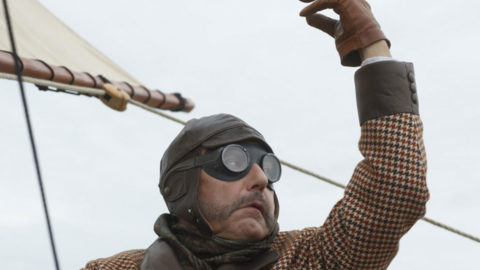Interview: Valeska Grisebach
In the 11 years since her previous feature, Longing, German director Valeska Grisebach has witnessed many of her contemporaries from the Berlin School—the somewhat amorphous stylistic banner under which she and others of her generation, such as Christian Petzold and Thomas Arlsan, were once grouped—make international inroads. Grisebach’s new film, Western, sees her moving away from localized scenarios to an unfamiliar milieu filled with its own unique personalities and pitfalls. Set in a small village on the border of Bulgaria and Greece, the movie focuses on a group of German laborers tasked with constructing a hydroelectric power plant amid the remote town’s otherwise untouched landscape. Odd within the ranks is Meinhard (Meinhard Neumann), a grizzled ex-Legionnaire who mostly keeps to himself when not glaring disapprovingly on the semi-barbaric actions of his coworkers, and in particular on those of his boss, Vincent (played by Reinhardt Wetrek). Following a troubling episode in which Vincent harasses a young woman while swimming, his coworkers and boss begin to provoke Meinhard with increasing regularity as he ingratiates himself with the townsfolk. Adopting many of the classic movie Western’s most recognizable visual motifs (long, languid shots; expansive, sun-dappled horizons) for a more allegorical take on the genre’s thematic hallmarks—including entrenched notions of ownership, masculinity, and xenophobia—Western updates Grisebach’s intentionally modest formal arsenal by investigating age-old cinematic and cultural tropes through a distinct, unfamiliar, yet nonetheless modern lens.
Grisebach sat down with Film Comment during the Cannes Film Festival following the premiere of Western in the Un Certain Regard section to discuss the film’s protracted genesis, the pressing influence of an increasingly corporatized Europe, and the search for a present-day equivalent of the iconic Western male. Western screens Saturday, September and 30 Sunday, October 1 at The New York Film Festival.
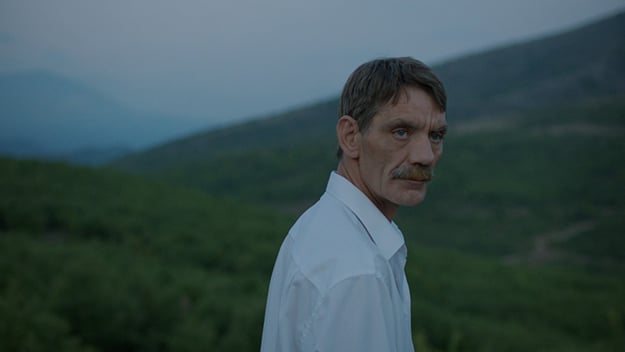
It’s been more than a decade since Longing. Have you worked on other projects, film or otherwise, in the interim?
First of all, I had a daughter, and I was working: teaching at film school and working on scripts with other directors. In the first years of my daughter’s life, I canceled a film, because I totally disappear when I’m shooting. Then it took a while to think about this project and how to make it. Because at the beginning of a project I don’t have a story. It’s more like I have a subject I’m interested in, and I start with a kind of personal, associative research. I like to do research; for me it’s the most beautiful part of making a film, so it took awhile. Also, I like life without film. But, then sadly, I realized, okay, [it’s been] 10 years, 11 years! [Laughs] But no, really, I would prefer to be a little bit faster.
You didn’t work from a traditional script, and you used nonprofessional actors as well. How did the narrative take shape?
Maybe it doesn’t look like a script, but it’s very important for me to have a stable construction. It’s a text that maybe looks like a treatment: some scenes have a lot of dialogue, and some scenes have maybe one or two lines, and I try to describe some atmosphere. I’m dealing with subtexts, and I want to create something in the text that others understand. I never give the script to the actors. For me it’s a beautiful moment when I can leave the script behind.
How did you come to this region of Bulgaria?
It took a while until I realized that this is maybe the perfect setting, that the new location should be Eastern Europe for these German construction workers in another country. I was traveling to Romania and Bulgaria—then at some point, I decided it should be Bulgaria. I was really traveling, as we say in German, into the blue, so I didn’t know where I would end [up]. I just knew I was interested in these border regions because you have such a mixture of people and so much movement. First I traveled to the Serbian border, then to the Greek border, and fell immediately in love with the area. I think it was always connected with these personal moments—you meet somebody, you start to talk, maybe you try a scene. I was always traveling with a little camera. It’s a very special place, and for now, a little bit hidden. But now, because of the crisis in Greece, a lot of Greek farms are trying to put part of the farm in Bulgaria. So at the moment this area is a little wealthier than other border areas, for example, compared to the border to Serbia. So it’s a very vivid area, with a lot of potential, and I thought it was the right counterpart for the Germans.
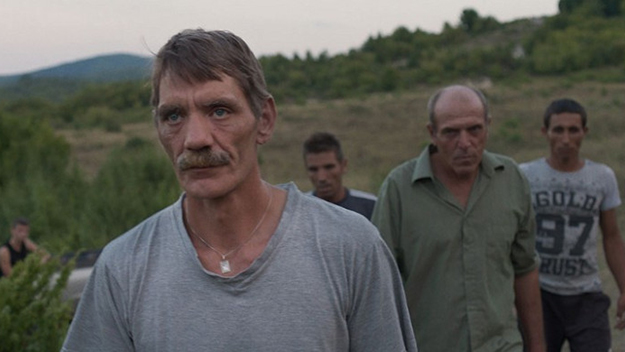
The film’s production must have played a role similar to that of the German laborers in the film. How did the villagers react to your shooting there?
I think in Bulgaria there are a lot of visitors who come only once. They say, okay, we will do this or that project, and then they disappear. But we created a really strong partnership, with a lot of support. When you start shooting, and the team gets bigger, you really have to think how to deal with the people in the village, and how not to disturb them? To us, it was a very nice situation.
What about working with the actors, and particularly with the lead, Meinhard Neumann?
They came from Germany. I started to interview men about their personal situations. That was when I thought, okay, which men look like men from Westerns? So I landed very fast on construction sites, because construction workers have these special clothes and tools on their belts, and they have this body language of “look at us.” I thought maybe it was a little bit primitive, but it was interesting to me. I found Meinhard Neumann years ago when I started to think about the project. I saw him in a horse market near Berlin. He was sitting there in a cowboy hat, but I was more impressed by his face, because it’s such an iconic face. So I said, okay, I’m looking for a man, an actor who looks very attractive and elegant, and somebody who catches the eyes of everybody, and you have some fantasies of him as a leader, but he should also be somebody who has the small man inside him, and he’s a little bit opportunistic and maybe wants to hide in a group of men, and doesn’t take responsibility. So a little bit [of an] ambivalent character. When I saw Meinhard, I thought, “He creates some kind of image.” So there’s a good contrast between the big and the small in the character.
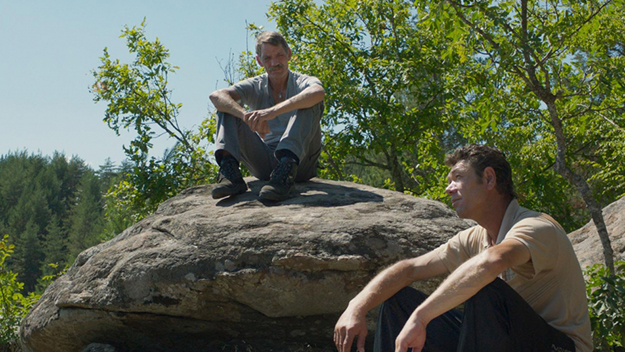
There’s a kind of parallel narrative to the film concerning the presence not only of an outside influence in a foreign land but also specifically of German industry in this part of Bulgaria. Can you speak a bit about the historical and sociopolitical dimensions of the film? This theme runs through your coproducer Maren Ade’s film Toni Erdmann as well.
In Europe we have these E.U.-financed projects, but to apply for these projects you have to fill out a lot of papers, very complicated. They’re there—firms exist only to make these kinds of applications. Sometimes for small firms in Bulgaria or Romania, they don’t know how to deal with these applications. So when you look at highways and bridges built in Romania, or construction sites in Bulgaria, you see all these big Austrian or German or Italian firms. Germany at the moment has such high status. For me it was interesting to deal with this. The last few years I was thinking of doing something about this seduction, the German people’s higher status, and I was thinking about doing something about this latent xenophobia—it’s not only in Germany; it’s everywhere, but in Germany I can feel it.
This notion of East meets West of course plays into the film’s title. But it’s most obviously a reference to the Western genre. Were you and cinematographer Bernhard Keller looking to specific Westerns or genre filmmakers for visual inspirations?
We did. For example, Winchester ’73 by Anthony Mann or The Big Country.
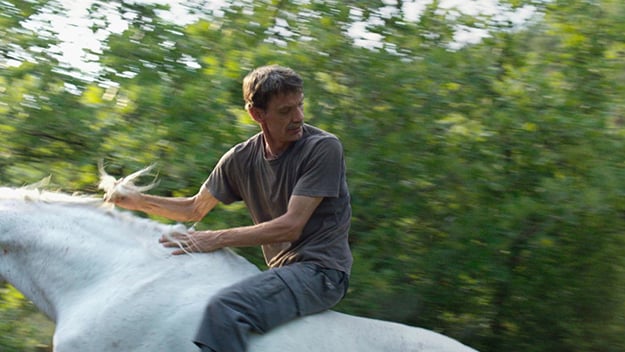
You seem to be disrupting or commenting on the genre’s masculine codes. Early on we see Vincent in a pretty alarming confrontation with a woman, and throughout the film Meinhard’s noble actions are challenged by his coworkers.
I really wanted to get closer to the lonely heroes of the genre and to see what they’re dealing with. It’s a burden if you’re not allowed to show your feelings, and they have a lot of feelings inside. There’s also maybe this ambivalence. I think this is something I really adore in the Western genre. It’s such a contemplative genre, so you’re dealing with contemplative role models, but at the same time it’s so modern in reflecting questions of the society. You’re looking for this romanticism or freedom, but at the same time you’re looking to come home. Maybe Meinhard is not so much looking to be an outsider; maybe in a way he’s looking more to be an insider, a kind of projection, that this foreign society could be happier than home.
In the absence of being able to fully communicate, smoking seems to take on an important role in the film. Was this kind of social pact among the characters something you guys discussed when making the film?
It came from the back door into the film, because smoking is so old-fashioned, and it’s also this physical thing of inhaling your tobacco! [Mimes inhaling smoke] So I realized, okay, it couldn’t be a film without cigarettes, and I was lucky that the men really smoked. It was interesting because in this area in Bulgaria, they are running tobacco, so a lot of cigarettes they are smoking come from this region.
Jordan Cronk is a critic and programmer based in Los Angeles. He runs the experimental screening series Acropolis Cinema and is co-artistic director of the Locarno in Los Angeles Film Festival.



